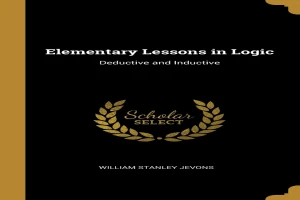Newly released
This book is new and will be uploaded as soon as it becomes available to us and if we secure the necessary publishing rights.

Elementary Lessons in Logic Book PDF
(0)
Author:
William Stanley JevonsNumber Of Reads:
70
Language:
English
Category:
Social sciencesSection:
Pages:
360
Quality:
good
Views:
1355
Quate
Review
Save
Share
New
Book Description
Henry Hazlitt strongly recommended this book for all students of the social sciences. It had a formative influence on his life. In fact, it is the book that taught him how to think.And not only Hazlitt. William Stanley Jevons's book was the seminal contribution that education many generations of English and American scholars that crucial discipline of logic. It teaches the rules for thinking. Now, this was a subject that every student once had to take, and not in college but quite early in life, and certainly by high school.No more. Today, it is widely assumed that there is no structure of thinking that is worth studying. And perhaps that explains why serious thinking is so rare. It is nothing short of astonishing that most people go all the way through school with no exposure to logic at all.We've long looked for a good text to bring into print. Jevons, one of the architects of the Marginal Revolution, is a great choice. To be sure, this book is not easy. It takes patience and discipline. It offers a great challenge to anyone. However, if you can go through the book and learn from it, you will have a massive advantage over colleagues, most of whom have never studied this area.Does it make sense that an economics publishers would bring out a book on logic? Certainly it does from a Misesian point of view. Logic is the method of economic thinking. Without it, indeed, economic theory is not possible.May Jevons school the current generation in the way he did so many previous ones.
William Stanley Jevons
William Stanley Jevons: English logician and economist with important contributions and scientific theories in the field of economic sciences.
Jevons was born in the English city of "Liverpool" in 1835 AD, and his father worked in the iron ore trade, and he was fond of studying science, and he also wrote sometimes on some economic and legal subjects; Therefore, he was keen to provide the best education for his son since he was young, until he sent him to “London” to receive his university education, but under some financial circumstances he was forced to leave it after two years.
After Jevons left university, he traveled to work in Australia; Where he spent nearly five years there, working as a financial analyst, and then returned again to his homeland, where he decided to complete his university studies, to work after graduating in the academic corps; He was a professor at the University of Manchester and London.
Jevons contributed to the development of the "value-utility" theory, which sees that the value of any commodity is determined by the benefit that the consumer obtains from this commodity; He worked on developing it into a "marginal utility theory". He also authored several important books in economics that were taught for decades in universities, such as his book "Political Economy", and he is considered one of those who established a new era in the history of economic ideas.
Jevons died in 1882.
Read More
Book Currently Unavailable
This book is currently unavailable for publication. We obtained it under a Creative Commons license, but the author or publisher has not granted permission to publish it.
Rate Now
5 Stars
4 Stars
3 Stars
2 Stars
1 Stars
Elementary Lessons in Logic Quotes
Top Rated
Latest
Quate
Be the first to leave a quote and earn 10 points
instead of 3
Comments
Be the first to leave a comment and earn 5 points
instead of 3